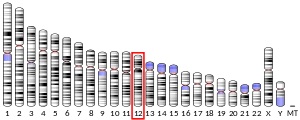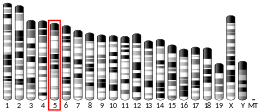ANAPC5
Anaphase-promoting complex subunit 5 is an enzyme that in humans is encoded by the ANAPC5 gene.[5][6]
The anaphase-promoting complex (APC) consists of at least 8 protein subunits, including APC5, CDC27 (APC3; MIM 116946), CDC16 (APC6; MIM 603461), and CDC23 (APC8; MIM 603462).[supplied by OMIM][6]
Interactions
ANAPC5 has been shown to interact with ANAPC1,[7][8] ANAPC4,[7] CDC27[7][9][10] and PABPC1.[9]
References
- GRCh38: Ensembl release 89: ENSG00000089053 - Ensembl, May 2017
- GRCm38: Ensembl release 89: ENSMUSG00000029472 - Ensembl, May 2017
- "Human PubMed Reference:". National Center for Biotechnology Information, U.S. National Library of Medicine.
- "Mouse PubMed Reference:". National Center for Biotechnology Information, U.S. National Library of Medicine.
- Yu H, Peters JM, King RW, Page AM, Hieter P, Kirschner MW (March 1998). "Identification of a cullin homology region in a subunit of the anaphase-promoting complex". Science. 279 (5354): 1219–22. Bibcode:1998Sci...279.1219Y. doi:10.1126/science.279.5354.1219. PMID 9469815.
- "Entrez Gene: ANAPC5 anaphase promoting complex subunit 5".
- Vodermaier, Hartmut C; Gieffers, Christian; Maurer-Stroh, Sebastian; Eisenhaber, Frank; Peters, Jan-Michael (September 2003). "TPR subunits of the anaphase-promoting complex mediate binding to the activator protein CDH1". Curr. Biol. 13 (17): 1459–68. doi:10.1016/S0960-9822(03)00581-5. ISSN 0960-9822. PMID 12956947.
- Sumara, I; Vorlaufer E; Gieffers C; Peters B H; Peters J M (November 2000). "Characterization of Vertebrate Cohesin Complexes and Their Regulation in Prophase". J. Cell Biol. 151 (4): 749–62. doi:10.1083/jcb.151.4.749. ISSN 0021-9525. PMC 2169443. PMID 11076961.
- Koloteva-Levine, Nadejda; Pinchasi, Dalia; Pereman, Idan; Zur, Amit; Brandeis, Michael; Elroy-Stein, Orna (May 2004). "The Apc5 Subunit of the Anaphase-Promoting Complex/Cyclosome Interacts with Poly(A) Binding Protein and Represses Internal Ribosome Entry Site-Mediated Translation". Mol. Cell. Biol. 24 (9): 3577–87. doi:10.1128/MCB.24.9.3577-3587.2004. ISSN 0270-7306. PMC 387753. PMID 15082755.
- Gmachl, M; Gieffers C; Podtelejnikov A V; Mann M; Peters J M (August 2000). "The RING-H2 finger protein APC11 and the E2 enzyme UBC4 are sufficient to ubiquitinate substrates of the anaphase-promoting complex". Proc. Natl. Acad. Sci. U.S.A. 97 (16): 8973–8. Bibcode:2000PNAS...97.8973G. doi:10.1073/pnas.97.16.8973. ISSN 0027-8424. PMC 16806. PMID 10922056.
External links
- Human ANAPC5 genome location and ANAPC5 gene details page in the UCSC Genome Browser.
Further reading
- Grossberger R, Gieffers C, Zachariae W, et al. (1999). "Characterization of the DOC1/APC10 subunit of the yeast and the human anaphase-promoting complex". J. Biol. Chem. 274 (20): 14500–7. doi:10.1074/jbc.274.20.14500. PMID 10318877.
- Gieffers C, Peters BH, Kramer ER, et al. (1999). "Expression of the CDH1-associated form of the anaphase-promoting complex in postmitotic neurons". Proc. Natl. Acad. Sci. U.S.A. 96 (20): 11317–22. Bibcode:1999PNAS...9611317G. doi:10.1073/pnas.96.20.11317. PMC 18031. PMID 10500174.
- Gmachl M, Gieffers C, Podtelejnikov AV, et al. (2000). "The RING-H2 finger protein APC11 and the E2 enzyme UBC4 are sufficient to ubiquitinate substrates of the anaphase-promoting complex". Proc. Natl. Acad. Sci. U.S.A. 97 (16): 8973–8. Bibcode:2000PNAS...97.8973G. doi:10.1073/pnas.97.16.8973. PMC 16806. PMID 10922056.
- Strausberg RL, Feingold EA, Grouse LH, et al. (2003). "Generation and initial analysis of more than 15,000 full-length human and mouse cDNA sequences". Proc. Natl. Acad. Sci. U.S.A. 99 (26): 16899–903. Bibcode:2002PNAS...9916899M. doi:10.1073/pnas.242603899. PMC 139241. PMID 12477932.
- Vodermaier HC, Gieffers C, Maurer-Stroh S, et al. (2004). "TPR subunits of the anaphase-promoting complex mediate binding to the activator protein CDH1". Curr. Biol. 13 (17): 1459–68. doi:10.1016/S0960-9822(03)00581-5. PMID 12956947.
- Kraft C, Herzog F, Gieffers C, et al. (2004). "Mitotic regulation of the human anaphase-promoting complex by phosphorylation". EMBO J. 22 (24): 6598–609. doi:10.1093/emboj/cdg627. PMC 291822. PMID 14657031.
- Ota T, Suzuki Y, Nishikawa T, et al. (2004). "Complete sequencing and characterization of 21,243 full-length human cDNAs". Nat. Genet. 36 (1): 40–5. doi:10.1038/ng1285. PMID 14702039.
- Koloteva-Levine N, Pinchasi D, Pereman I, et al. (2004). "The Apc5 Subunit of the Anaphase-Promoting Complex/Cyclosome Interacts with Poly(A) Binding Protein and Represses Internal Ribosome Entry Site-Mediated Translation". Mol. Cell. Biol. 24 (9): 3577–87. doi:10.1128/MCB.24.9.3577-3587.2004. PMC 387753. PMID 15082755.
- Beausoleil SA, Jedrychowski M, Schwartz D, et al. (2004). "Large-scale characterization of HeLa cell nuclear phosphoproteins". Proc. Natl. Acad. Sci. U.S.A. 101 (33): 12130–5. Bibcode:2004PNAS..10112130B. doi:10.1073/pnas.0404720101. PMC 514446. PMID 15302935.
- Gerhard DS, Wagner L, Feingold EA, et al. (2004). "The Status, Quality, and Expansion of the NIH Full-Length cDNA Project: The Mammalian Gene Collection (MGC)". Genome Res. 14 (10B): 2121–7. doi:10.1101/gr.2596504. PMC 528928. PMID 15489334.
- Barrios-Rodiles M, Brown KR, Ozdamar B, et al. (2005). "High-throughput mapping of a dynamic signaling network in mammalian cells". Science. 307 (5715): 1621–5. Bibcode:2005Sci...307.1621B. doi:10.1126/science.1105776. PMID 15761153.
- Rual JF, Venkatesan K, Hao T, et al. (2005). "Towards a proteome-scale map of the human protein-protein interaction network". Nature. 437 (7062): 1173–8. Bibcode:2005Natur.437.1173R. doi:10.1038/nature04209. PMID 16189514.
- Turnell AS, Stewart GS, Grand RJ, et al. (2005). "The APC/C and CBP/p300 cooperate to regulate transcription and cell-cycle progression". Nature. 438 (7068): 690–5. Bibcode:2005Natur.438..690T. doi:10.1038/nature04151. PMID 16319895.
This article is issued from Wikipedia. The text is licensed under Creative Commons - Attribution - Sharealike. Additional terms may apply for the media files.






